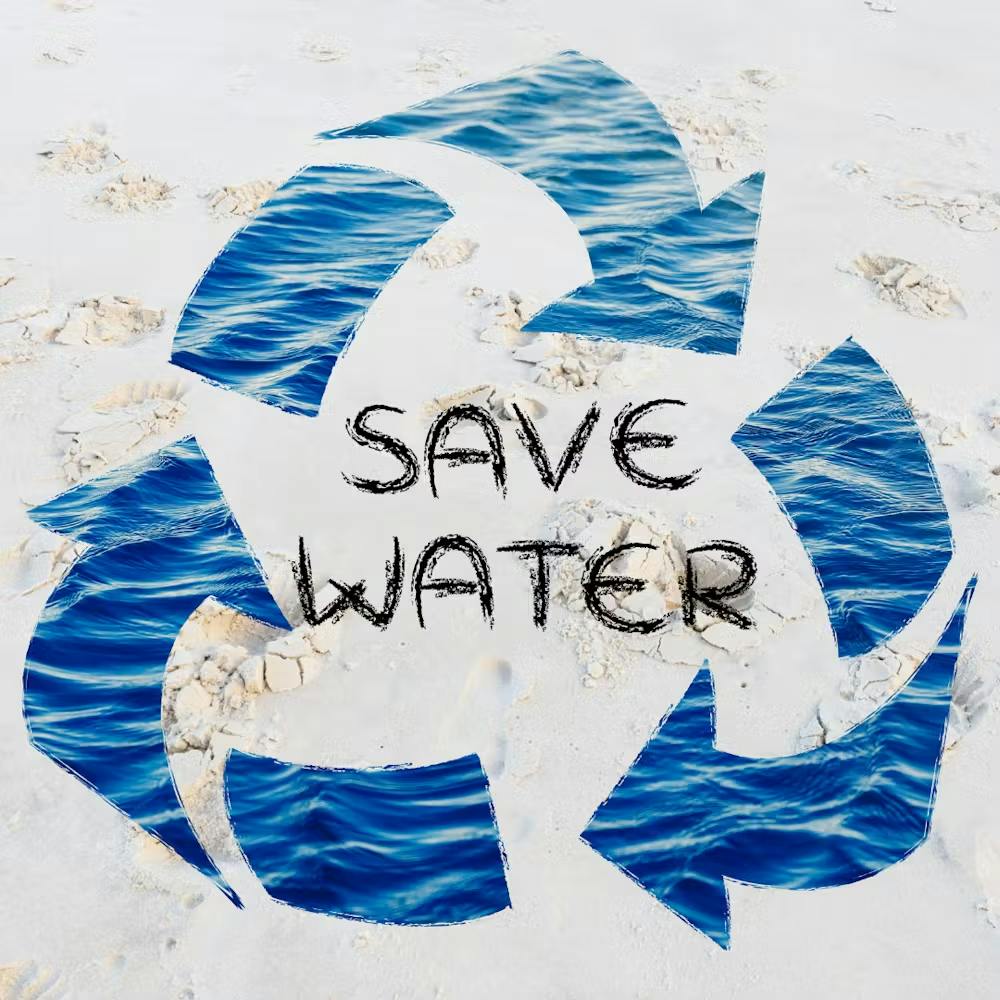Back to news
Water Saving Week 2025
Hosted by WaterWise, this annual event celebrates its 9th year, rallying individuals, households, and communities to take action in conserving water resources. In this post, we delve into the significance of Water Saving Week, explore the challenges of water scarcity in the UK, and provide practical tips for everyday people to make a difference
- Water Saving Week
- WaterWise
But it rains constantly in the UK, surely we have a good supply of water?
Climate change is disrupting our weather, making it more extreme, including drier and hotter summers and milder, wetter winters. The UK has faced water shortages with increasing frequency in recent years, including:
· 1995-1997
· 2010-2012
· 2018-2019
· 2022
2022 was very hot and dry, leading to drought conditions including temporary bans on water usage.

So what is Water Saving Week?
Water Saving Week is an initiative led by WaterWise, dedicated to raising awareness about water efficiency and conservation. This year, the focus is on the power of individual actions in shaping the future of our water resources. Through shared efforts and collective action, we can drive positive change for communities across the UK. This week-long campaign offers a platform for education, engagement, and empowerment, encouraging households to embrace water-saving habits that have a lasting impact.
Why Water Saving Week Matters. . .
Water is a precious resource that sustains life, yet it is often taken for granted. Water Saving Week serves as a reminder of the importance of responsible water use and the urgent need for conservation efforts.
Have you ever thought about the water that goes into producing the coffee for your morning cuppa?
Or perhaps your favourite jumper?
There is hidden water usage in everything we do and possess!
Despite the perception of abundant rainfall in the UK, water stress and scarcity persist in many regions, posing significant challenges to ecosystems, communities, and economies. By raising awareness and promoting sustainable practices, Water Saving Week empowers individuals to become stewards of water conservation, safeguarding this vital resource for future generations.
Don't forget that saving water is beneficial to you as an individual, not just the environment. Passive and low effort habits such as shorter showers, turning off the tap, flushing less often can lead to savings off your monthly water bill.
Why is saving water crucial?
Conserving water is essential for many reasons:
- Several regions of the UK will face water stress by 2030 and even more areas by 2040. By being mindful with our water use we can help mitigate this, especially during periods of drought.
- Using water has an environmental impact. Greenhouse gases are produced in the treatment and supply process, using less water will help reduce emissions.
- Over exploitation of our resources puts pressures on water sources such as ground water and rivers, this can cause degradation of habitats and loss of biodiversity as other species rely on water resources for survival.
- Water quality is essential for the health of humans and habitats. Lower water levels can increase the concentration of pollutants in water bodies. This includes run off from agriculture and household waste.
By embracing water-saving habits, households can contribute to environmental sustainability while reaping economic benefits and enhancing quality of life.
What is causing water stress in the UK?
Drought in the UK occurs when there are periods of low rainfall. This can be worsened with a warmer climate as evaporation increases. Other factors impact this including:
- Climate change
-Leading to more extreme weather conditions and unpredictable rainfall patterns.
- Population growth
-This places extra strain on resources, particularly in densely populated areas.
- Increased demand
-Warmer weather often leads to increased demand placed upon water supplies.
Water Saving Week provides an opportunity to debunk common misconceptions and raise awareness about the challenges of water scarcity. By understanding the root causes and consequences of water stress, individuals can better appreciate the importance of water conservation and take proactive steps to address the issue.
Waterwise's Conference 2025
Our very own Dr Sarah Bunney highlighted the importance of using rainwater as a solution to flooding and water scarcity in 2025's Waterwise Conference. Covering topics including drought, the increasing number of unpredictable water events and the need for innovation and public engagement within the sector.
Helping to raise awareness for such important topics is crucial in creating a more sustainable future for our water resources. If you want to find you how you can get involved and do your bit, keep reading!

How can you get involved?
Water Saving Week encourages individuals to take simple yet impactful actions to conserve water in their daily lives. From reducing shower times and fixing leaks to harvesting rainwater and using water-efficient appliances, there are numerous ways for households to make a difference. By adopting these practices, every person can contribute to preserving water resources and building more sustainable communities. Moreover, Water Saving Week promotes collective action and community engagement, fostering a sense of shared responsibility and solidarity in addressing water challenges.
Here are some easy to implement water saving tips:
Kitchen
Fully Load your Kitchen appliances
Make sure your dishwasher and washing machine are fully loaded before using them! Or use half-load and economy settings to optimize water usage.
Use a washing up bowl
A running tap can waste up to 12 litres per minute, while a washing-up bowl typically uses around 8 litres. This simple switch can help you save up to 50 litres per wash, reducing both water waste and your bill.
Don't pre-rinse dishes
Modern dishwashers are designed to remove food residue effectively, making pre-rinsing unnecessary. Simply scrape any large food particles into the bin and let your dishwasher do the rest.
Go Eco!
Eco-settings on a dishwasher often reduce water usage to around 10 litres per cycle.
Depending on the age of your washing machine, the average water usage is around 50 litres per load. Although older machines can use up to 180 litres per wash! Using modes like eco, quick wash or express wash will use less water, sometimes as little as 35 litres. A washing machine eco-mode also uses less energy - around 35-59%! By using these modes you can save water, save energy and cut your bills!
Keep a bottle of drinking water in the fridge
Put a large bottle of water in the fridge so you don’t have to run the tap each time you get a drink! Waiting for taps to run cold can use up to 10 litres of water daily.
Bathroom
Did you know your loo could be leaking?
Fix dripping taps and leaky loos. A leaky toilet can waste between 200-400 litres of water a day, often without you noticing! To check if your toilet is leaking, put a few drops of food colouring in the tank and wait 15 minutes without flushing. If colouring appears in the bowl, you have a leak that needs fixing.
Fix those dripping taps
A single dripping tap could waste up to 15 litres of water day. That's almost 5,500 litres a year - over 65 bathtubs of water! Don't forget, you can also add aerators to your bathroom taps too
Turn the tap off
Turn off the tap when brushing your teeth, it can save 64 cups of water.
Shorter Showers
Reduce your shower time by setting a timer - a 1 minute reduction can save 10% water use!
Aerate
Use an aerator in your shower head - this can use 50% less water
Check for leaks
A leaking toilet can waste between 200 to 400 litres every day. That’s between 50 and 100 flushes!
Garden
Water your lawn deeply but less frequently
Deep, infrequent watering encourages stronger root growth, making your lawn more drought-resistant. Water until the soil is moist 10-15cm below the surface, then wait until the grass shows slight signs of stress (footprints remain visible or grass loses its bounce) before watering again. This approach develops deeper roots that require less water in the future and creates a more resilient lawn.
Time your watering for maximum efficiency
Water plants early in the morning (before 10am) or late in the evening (after 4pm) to reduce evaporation. During these cooler hours, more water reaches the roots instead of evaporating in the midday heat. Morning watering is ideal as it allows foliage to dry during the day, reducing disease risk. This strategic timing can reduce water usage by up to 30% while keeping plants healthier.
Harvest rainwater
Use a water butt or rainplanter to capture rain in your garden. Make this even more efficient by connecting it to your downpipes! You’ll slow the flow of water into drainage systems whilst storing water for drier periods.
Use a watering can
Did you know hosepipes and sprinklers can use between 500 and 1,000 litres of water every hour? Using a watering can for your outdoor spaces is much more efficient!
Drought resistant plants
Use drought resistant and tolerant plants in your outdoor spaces. These plants are hardier and will require less watering